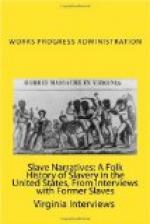He says that his master and mistress were very kind to the slaves and would never whip them, nor would he allow the “driver” who was a white man named Barton to do so. Barton lived in a home especially built for him on the plantation. If the “driver” whipped any of them, all that was necessary for the slave who had been whipped was to report it to the master and the “driver” was dismissed, as he was a salaried man.
Plantation Life. The slaves lived in log cabins especially built for them. They were ceiled and arranged in such a manner as to retain the heat in winter from the large fireplaces constructed therein.
Just before the dawn of day, the slaves were aroused from their slumber by a loud blast from a cow-horn that was blown by the “driver” as a signal to prepare themselves for the fields. The plantation being so expansive, those who had to go a long distance to the area where they worked, were taken in wagons, those working nearby walked. They took their meals along with them and had their breakfast and dinner on the fields. An hour was allowed for this purpose. The slaves worked while they sang spirituals to break the monotony of long hours of work. At the setting of the sun, with their day’s work all done, they returned to their cabins and prepared their evening’s meal. Having finished this, the religious among them would gather at one of the cabin doors and give thanks to God in the form of long supplications and old fashioned songs. Many of them being highly emotional would respond in shouts of hallelujahs sometimes causing the entire group to become “happy” concluding in shouting and praise to God. The wicked slaves expended their pent up emotions in song and dance. Gathering at one of the cabin doors they would sing and dance to the tunes of a fife, banjo or fiddle that was played by one of their number. Finished with this diversion they would retire to await the dawn of a new day which indicated more work. The various plantations had white men employed as “patrols” whose duties were to see that the slaves remained on their own plantations, and if they were caught going off without a permit from the master, they were whipped with a “raw hide” by the “driver.” There was an exception to this rule, however, on Sundays the religious slaves were allowed to visit other plantations where religious services were being held without having to go through the matter of having a permit.
Religion. There was a free colored man who was called “Father James Page,” owned by a family of Parkers of Tallahassee. He was freed by them to go and preach to his own people. He could read and write and would visit all the plantations in Tallahassee, preaching the gospel. Each plantation would get a visit from him one Sunday of each month. The slaves on the Randolph plantation would congregate in one of the cabins to receive him where he would read the Bible and preach and sing. Many times the services were punctuated by much shouting from the “happy ones.” At these services the sacrament was served to those who had accepted Christ, those who had not, and were willing to accept Him were received and prepared for baptism on the next visit of “Father Page.”




